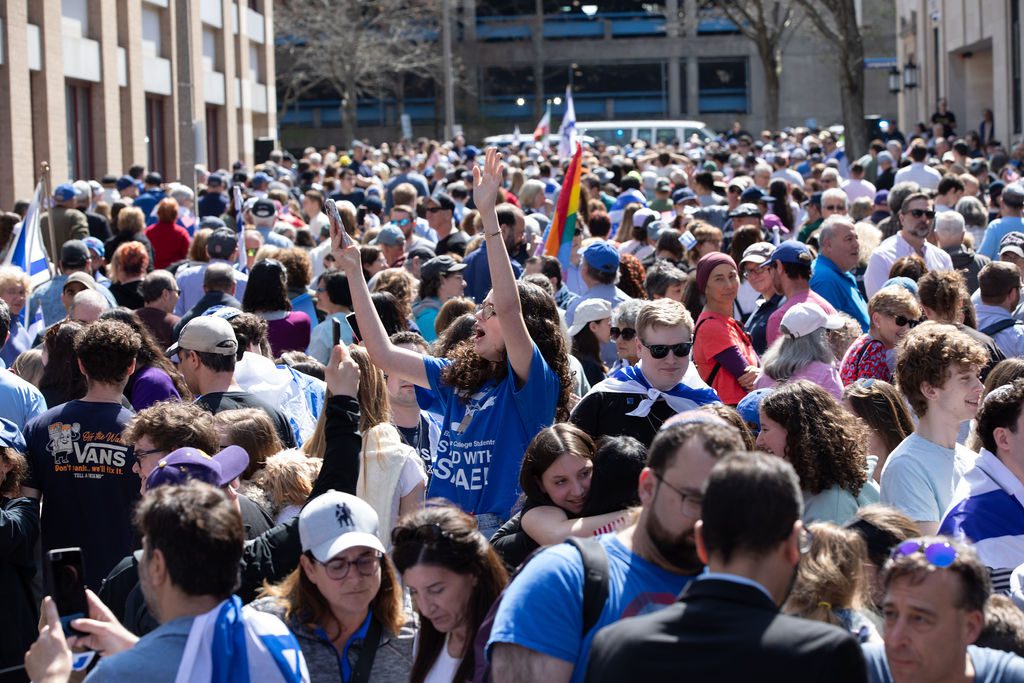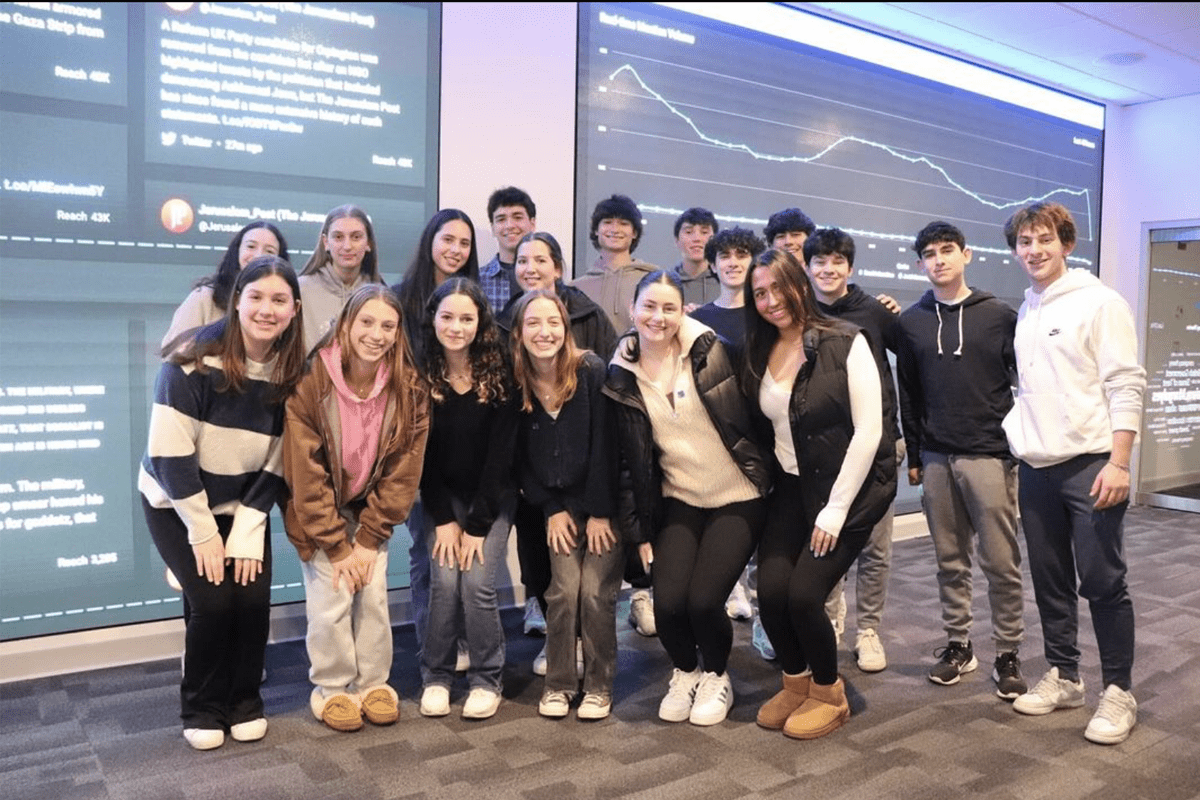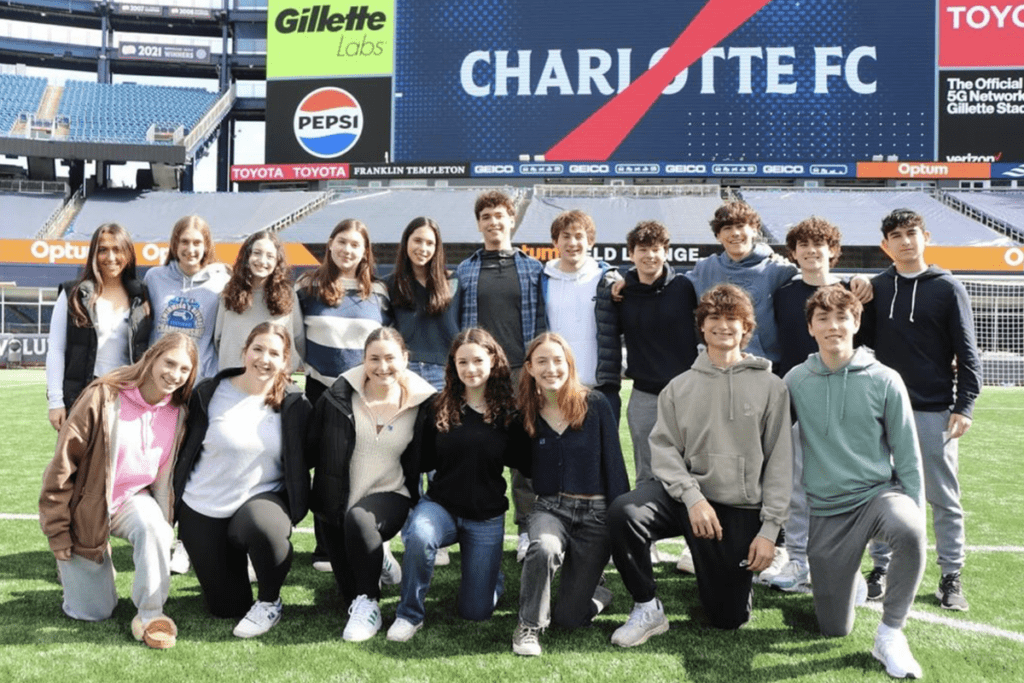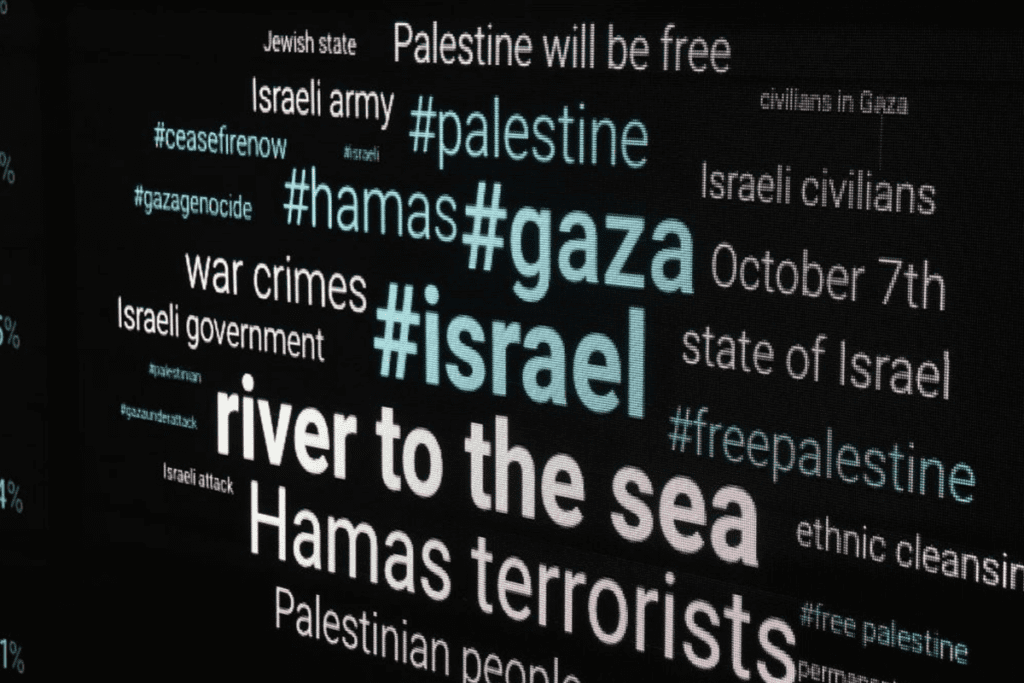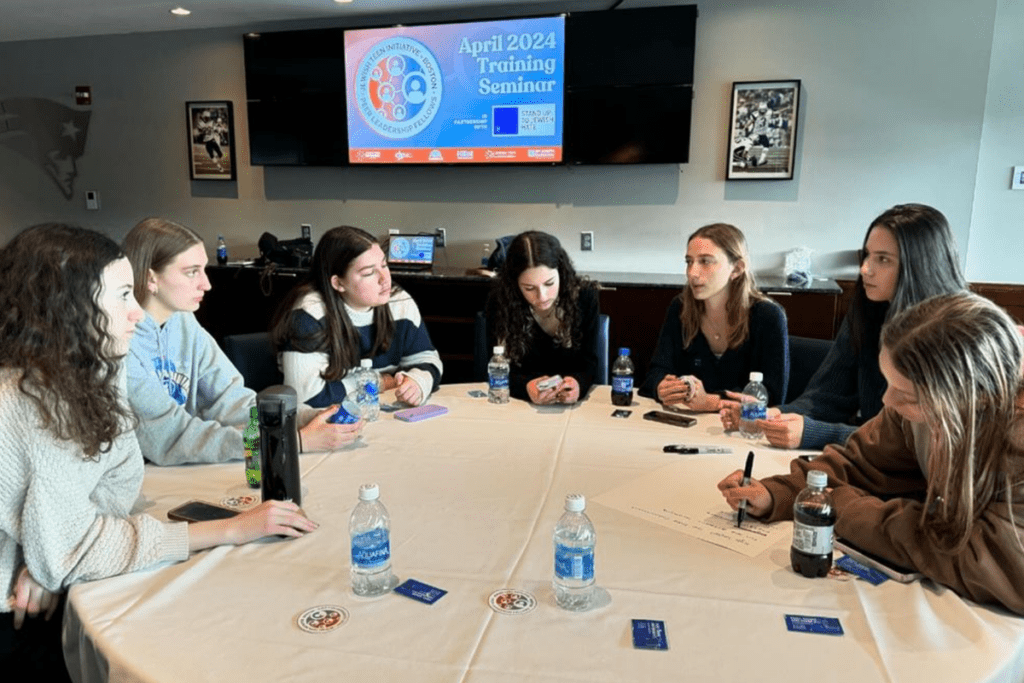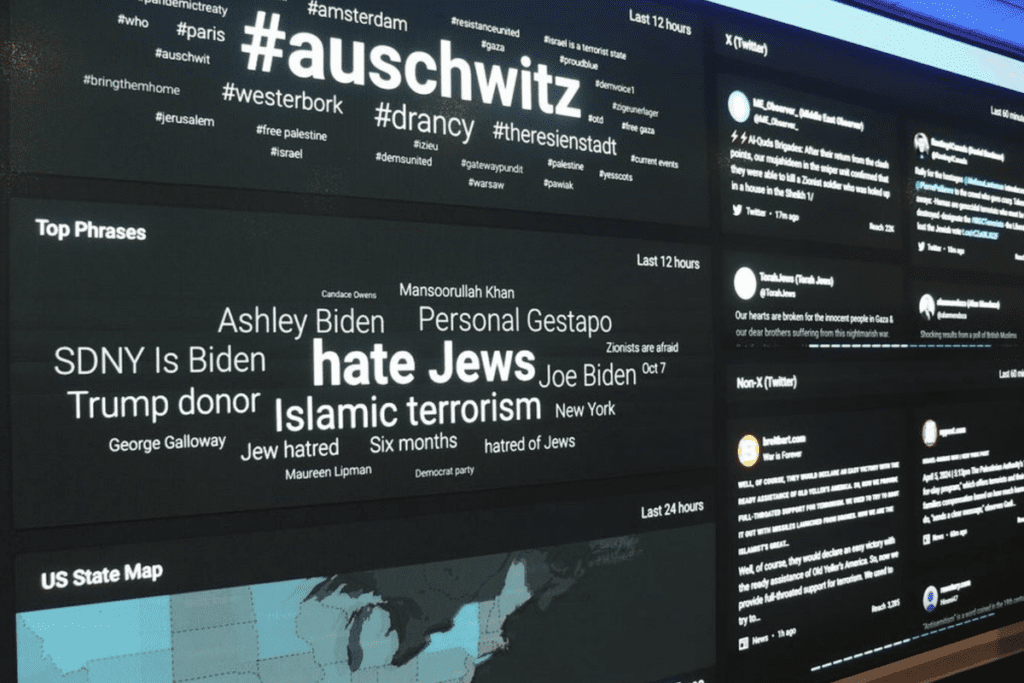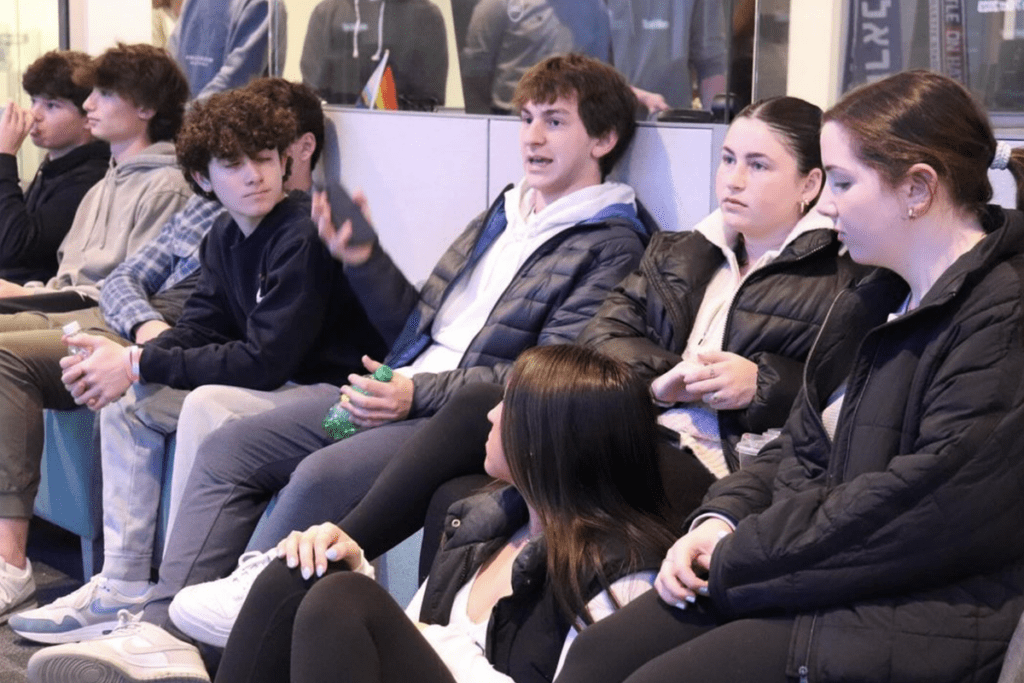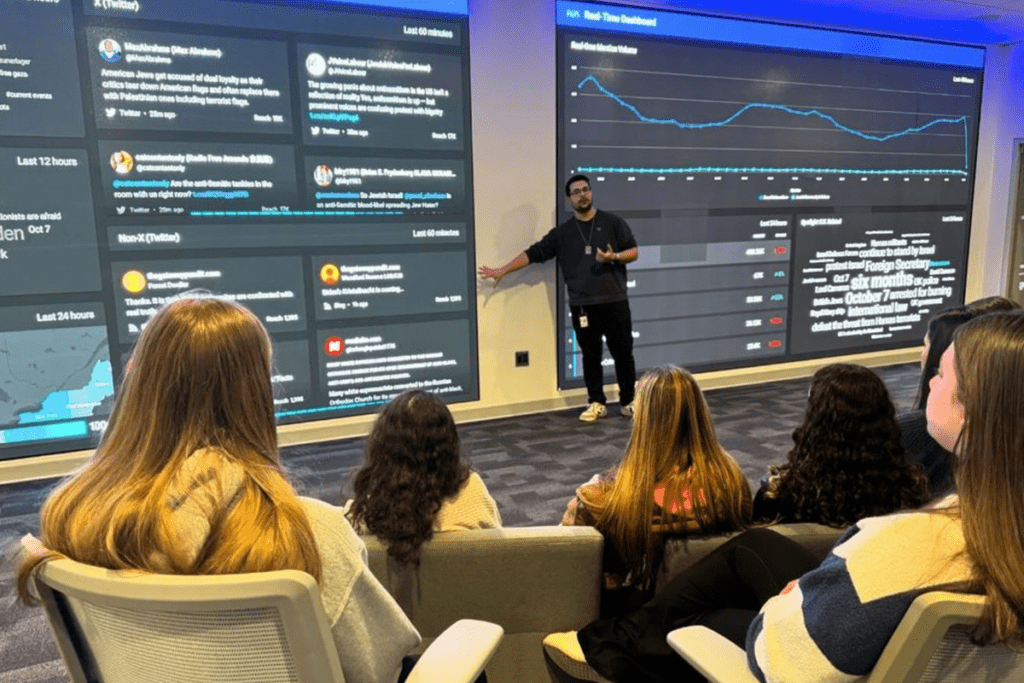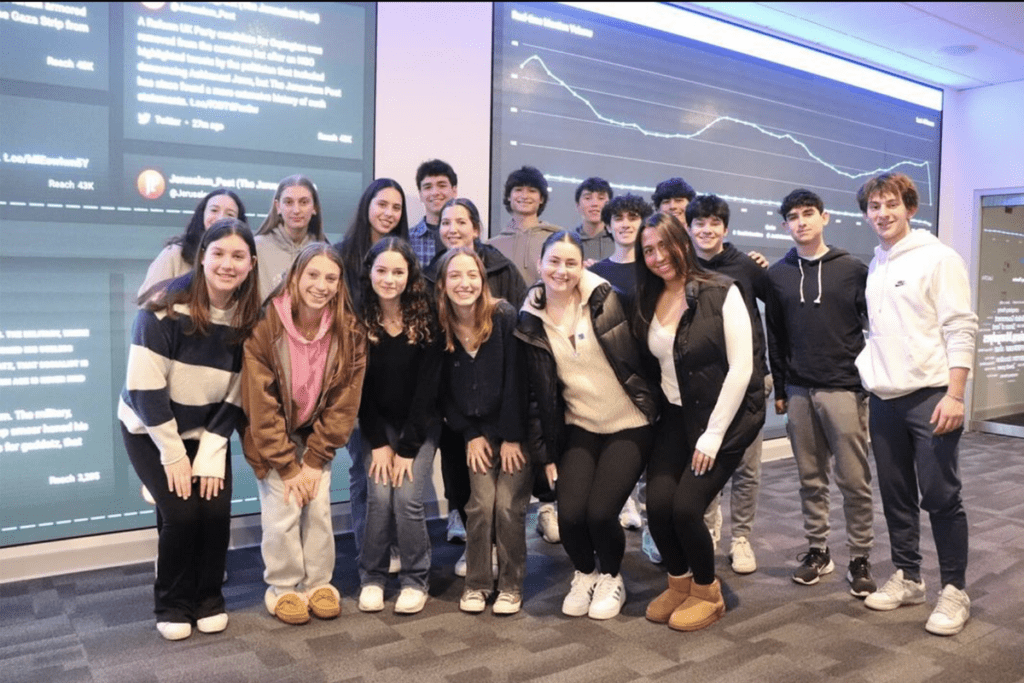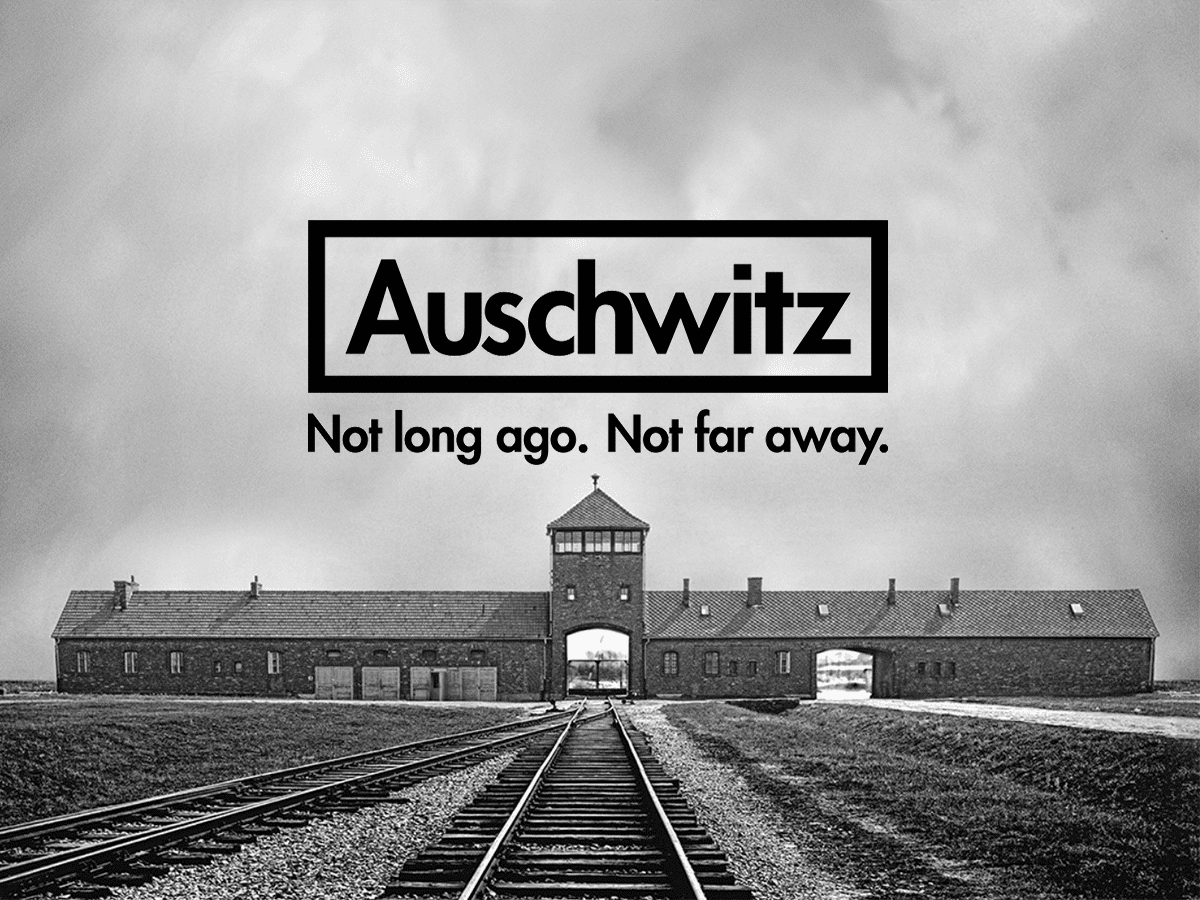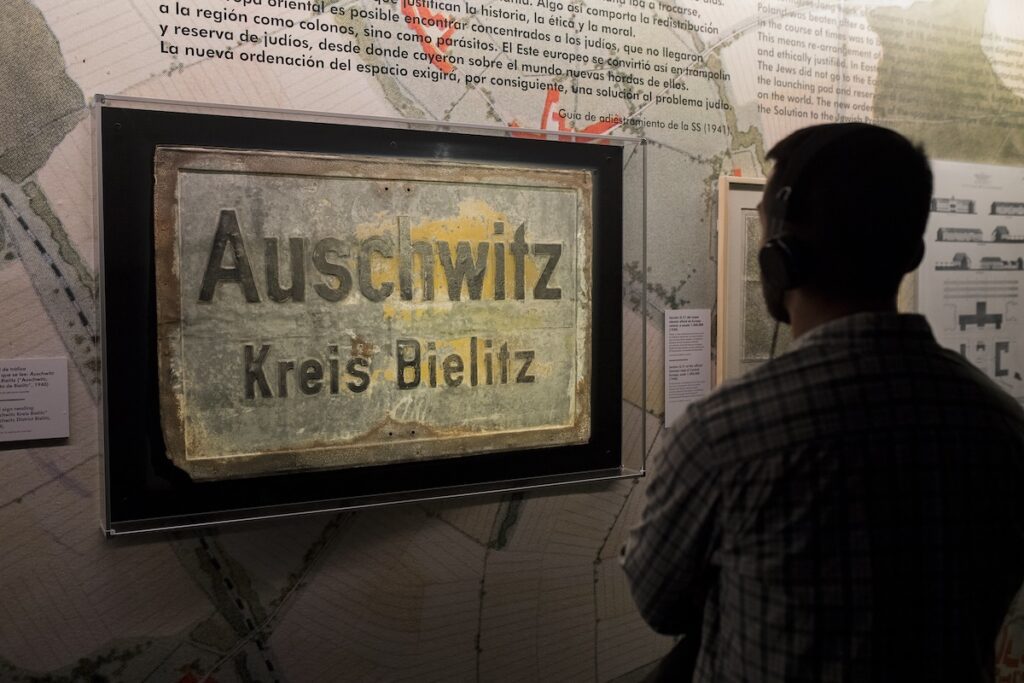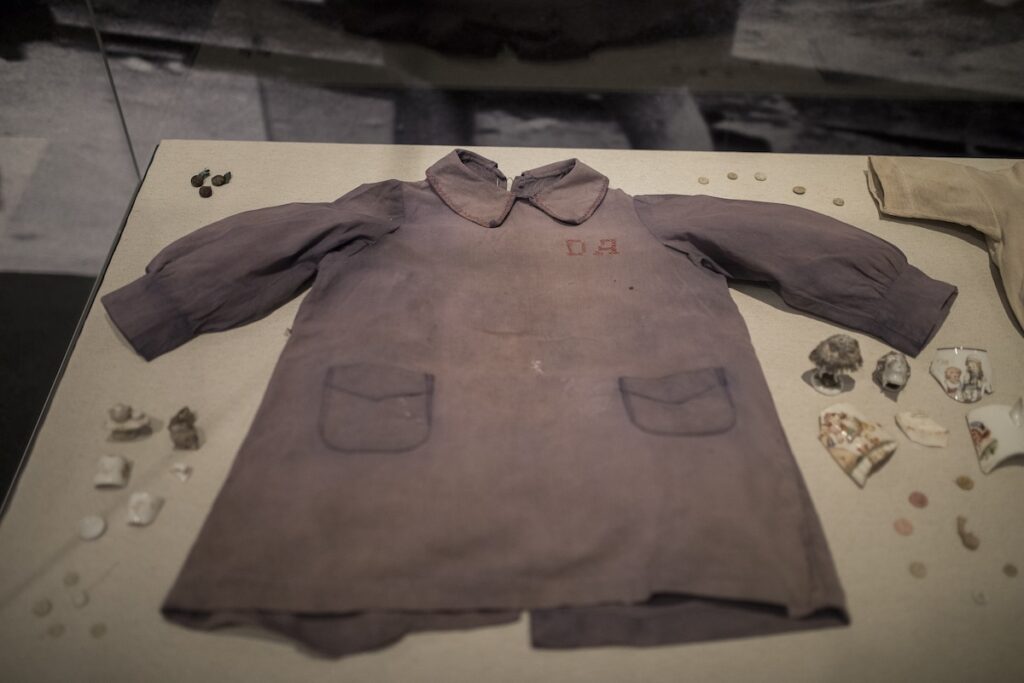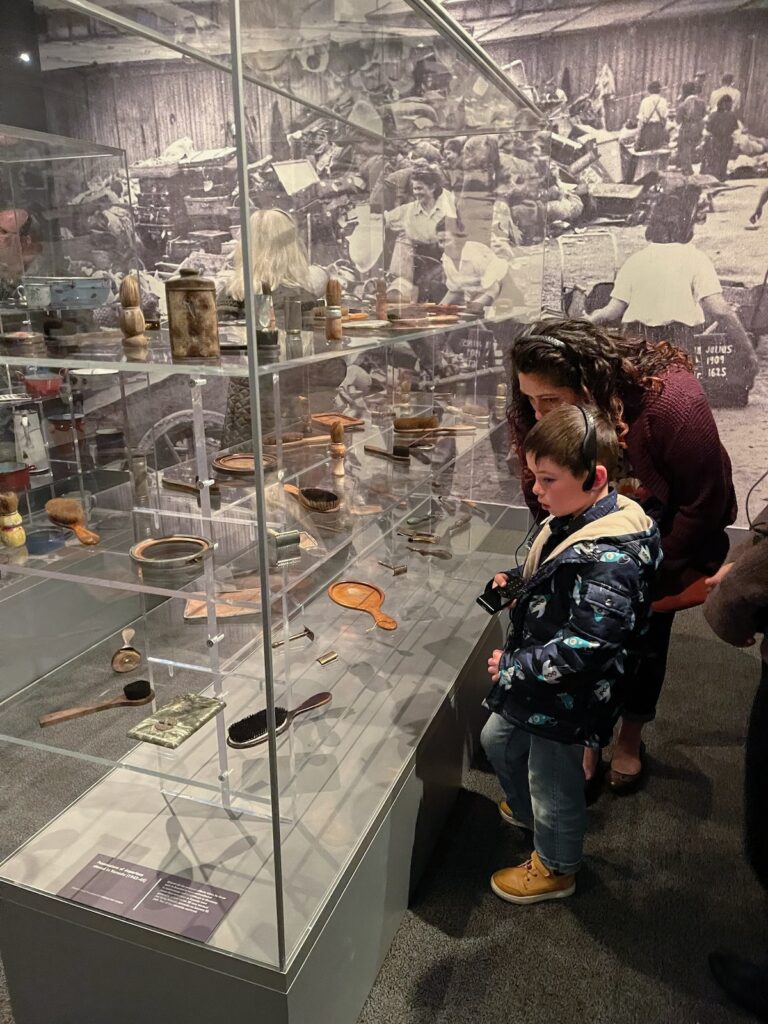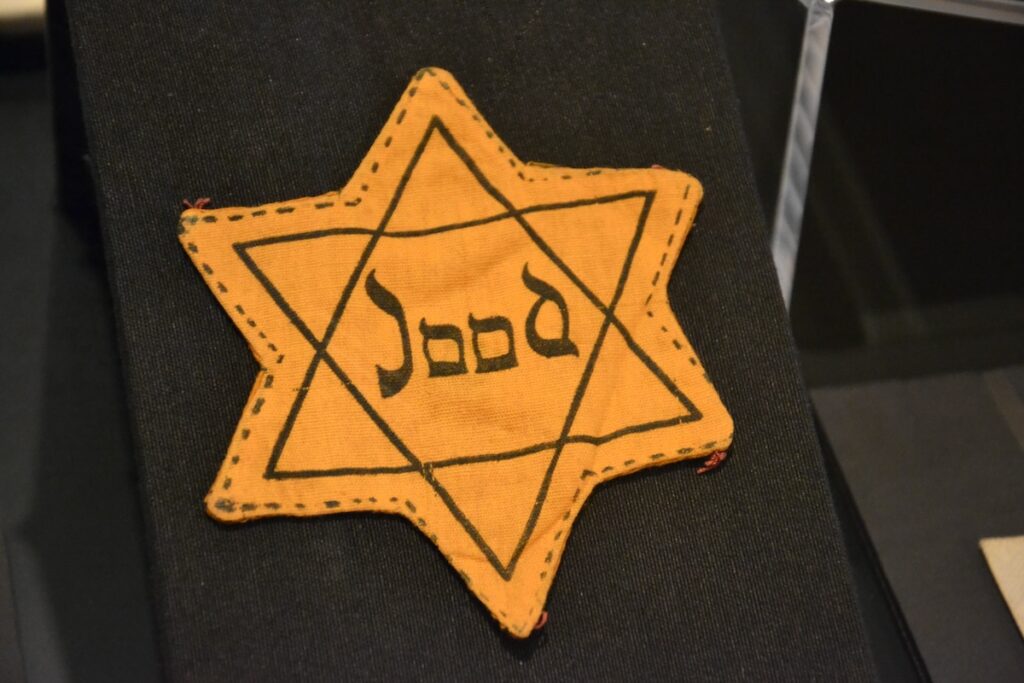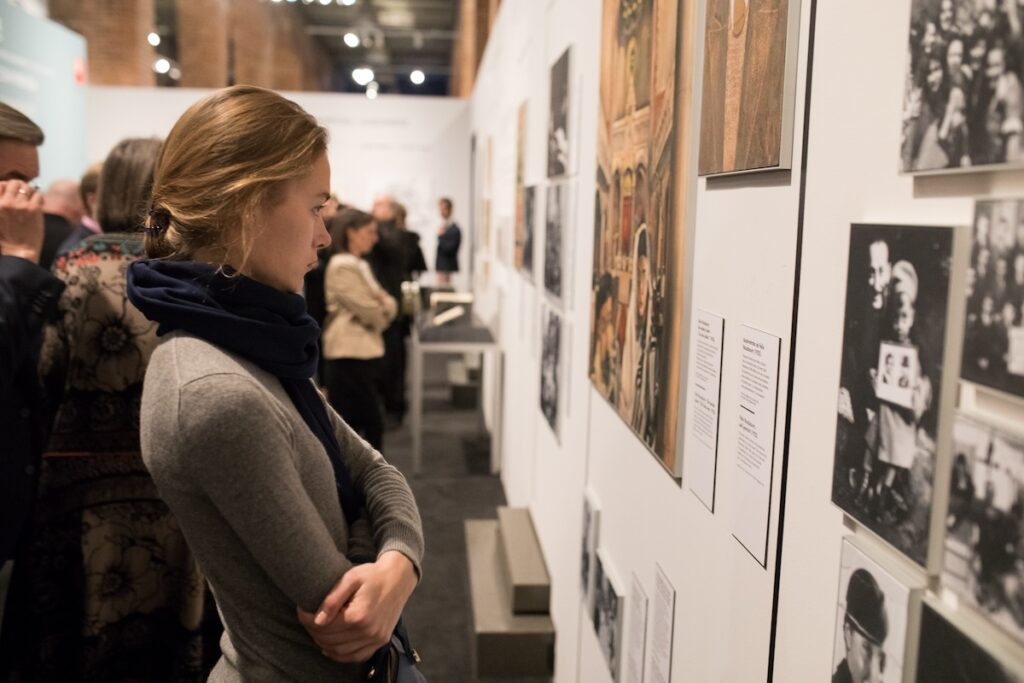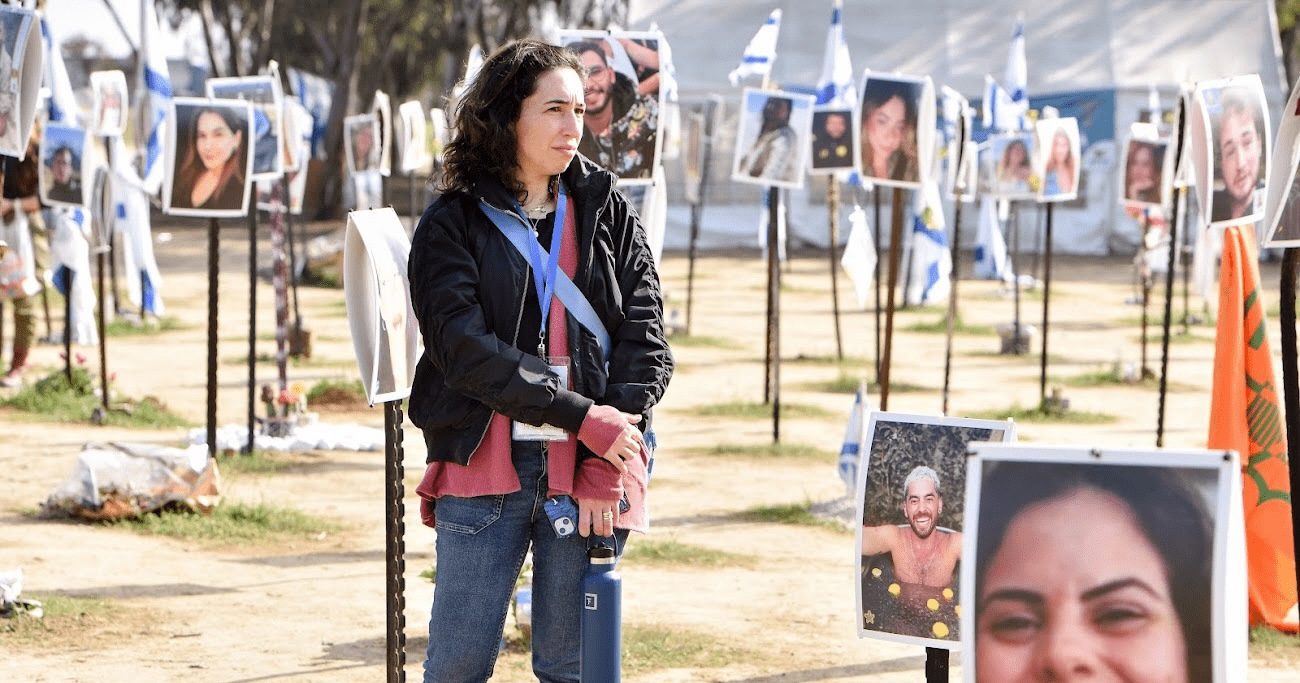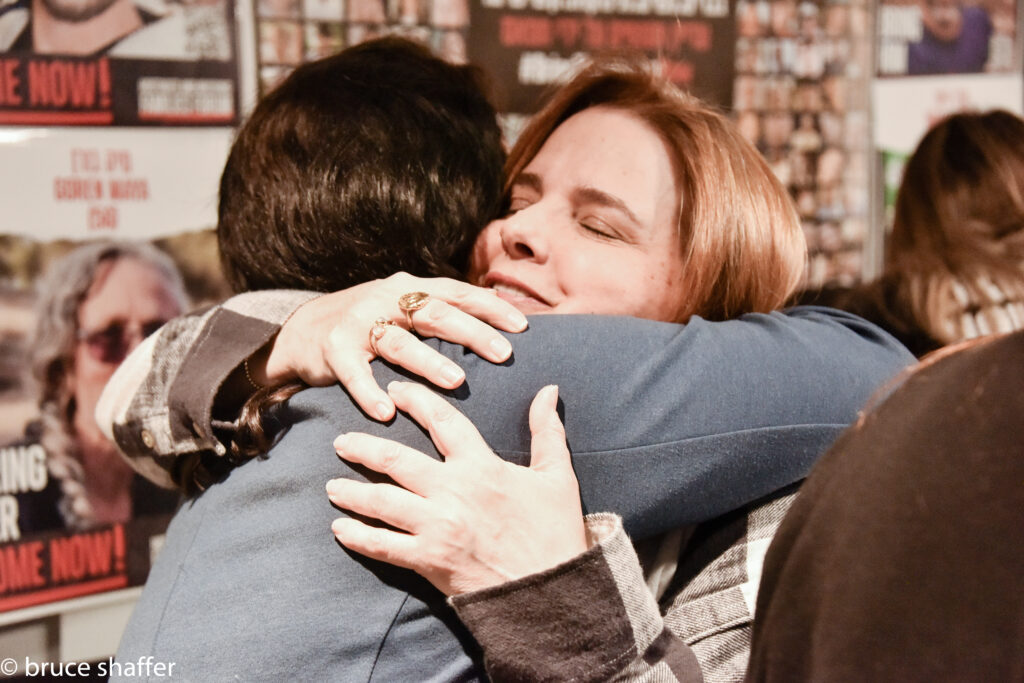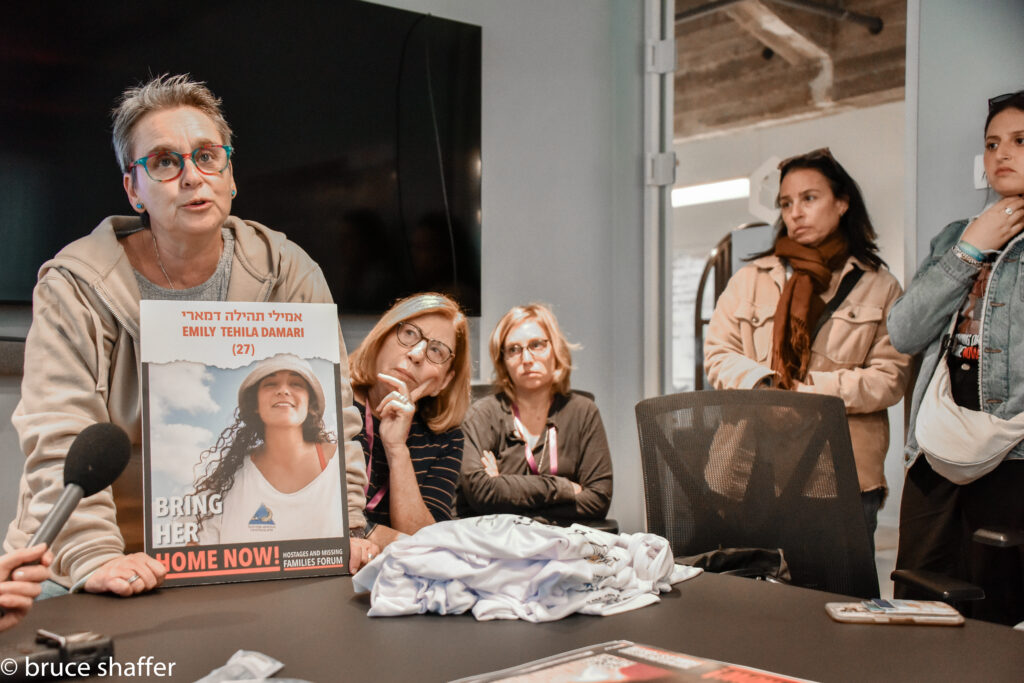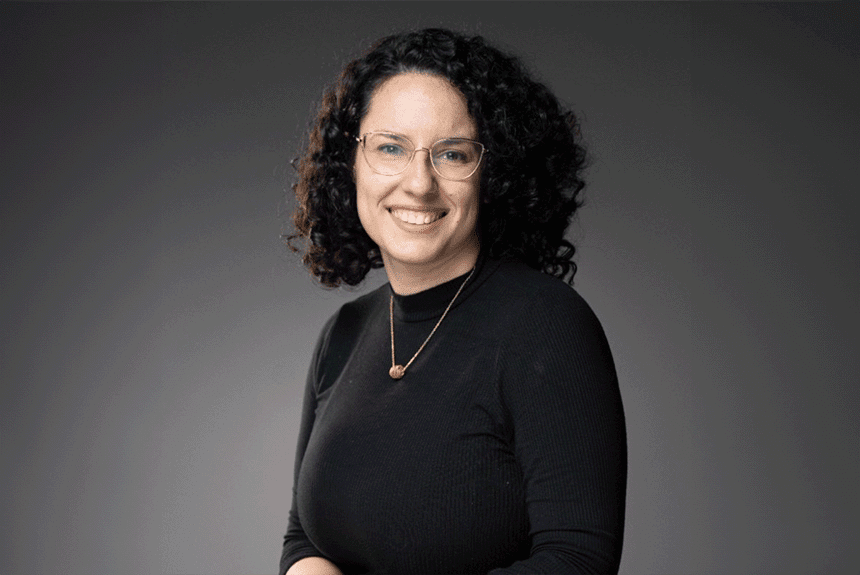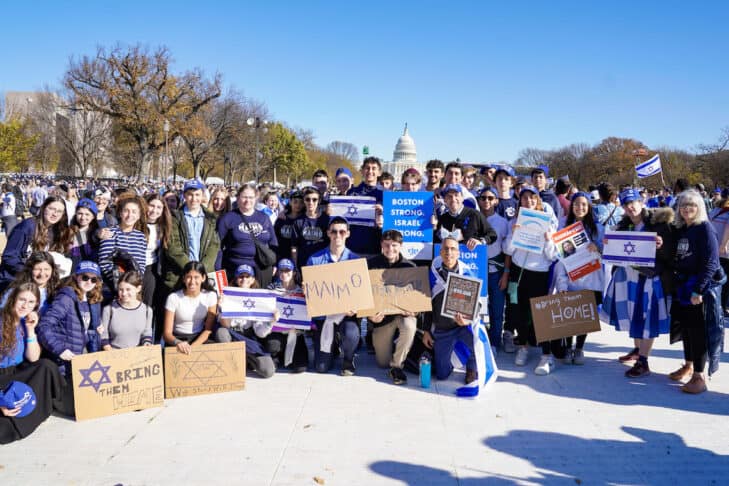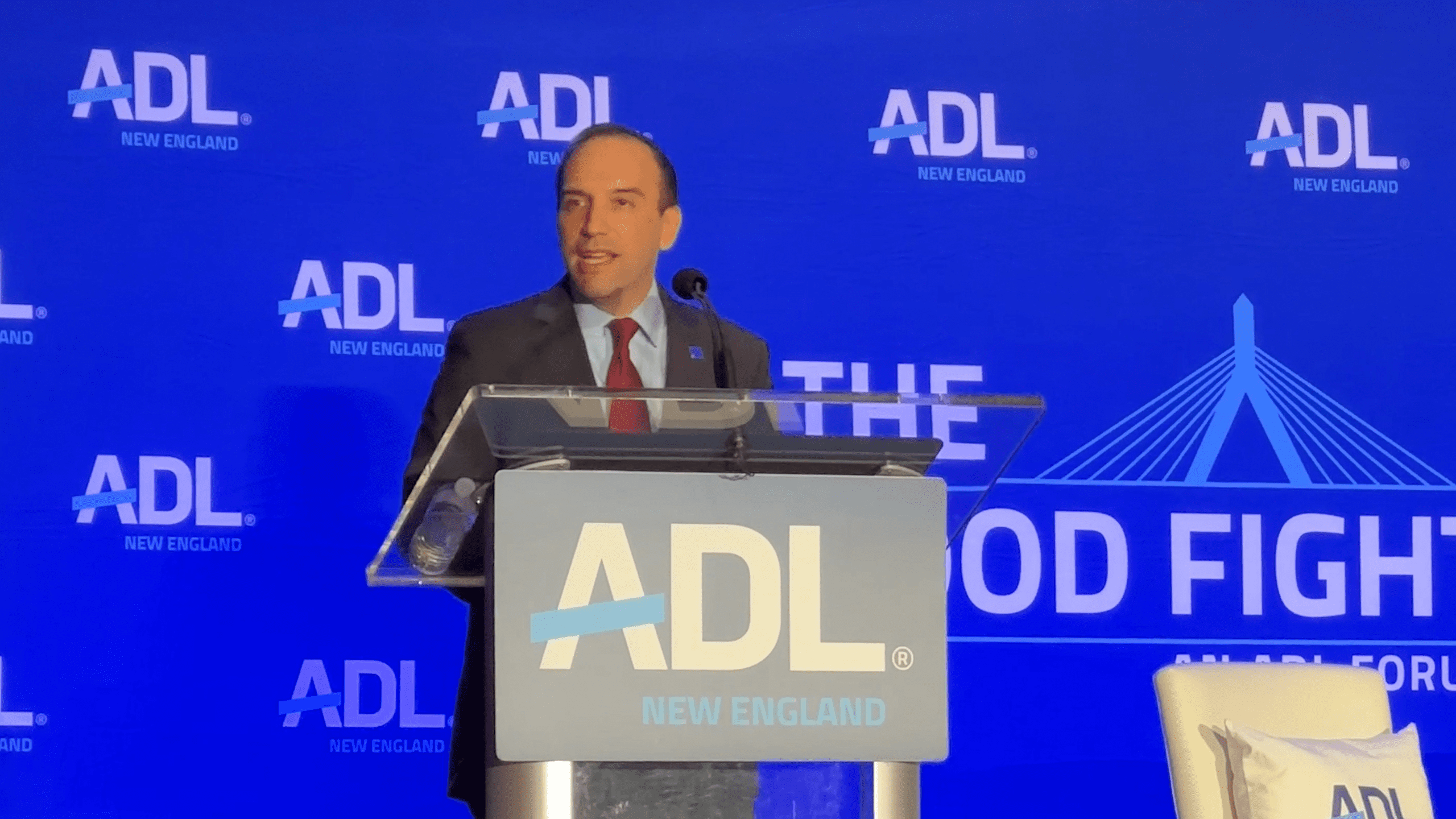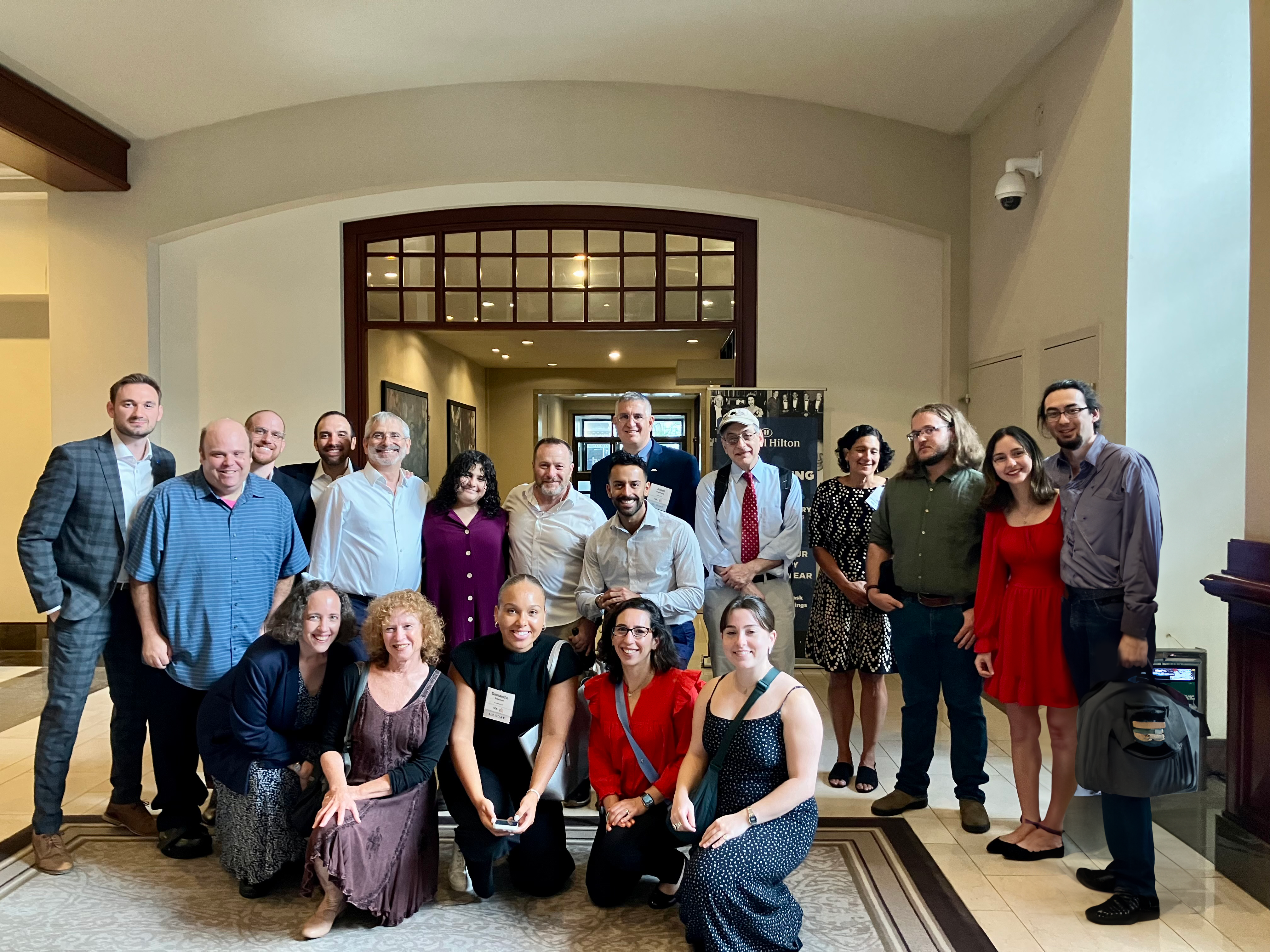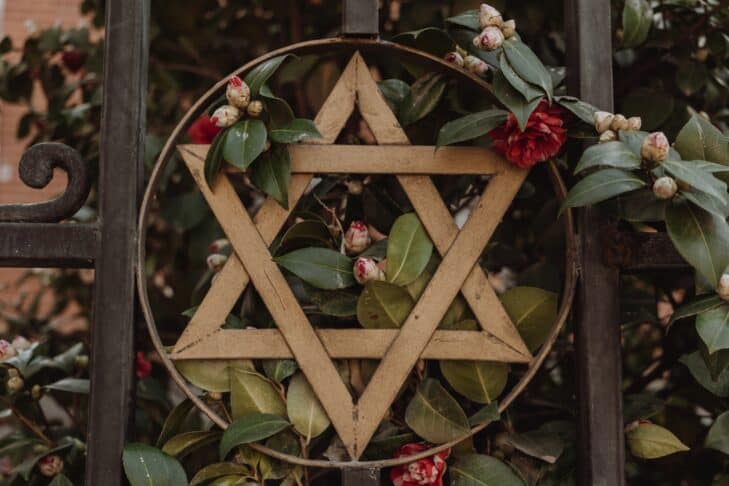More than 1,500 people gathered outside Temple Israel of Boston on April 28 to support Jewish students and state, loudly and proudly, that we will not tolerate antisemitism on our campuses or anywhere else.
Action: Find Community
Boston teens visited the Foundation to Combat Antisemitism headquarters
By Molly Kazan, Fighting Antisemitism Manager at Combined Jewish Philanthropies
On Sunday, April 7, 18 teen leaders from CJP’s Jewish Teen Initiative (JTI) Peer Leadership Fellowship visited the Foundation to Combat Antisemitism (FCAS) headquartered at Gillette Stadium. Fellows explored how FCAS’ work connects to CJP’s Center for Combating Antisemitism, and how they themselves can become better change agents in local efforts to fight Jewish hate.
The visit was planned in response to a February 2024 study the Fellows conducted amongst their peers citing growing concerns in antisemitism among Boston-area Jewish teens. The Peer Leadership Fellowship is a signature program of JTI at CJP that trains and empowers teens in grades 10 through 12 to become communal connectors through monthly gatherings.
“Auschwitz. Not Long Ago. Not Far Away.” Debuts on March 15
By Kara Baskin
On Friday, March 15, “Auschwitz. Not Long Ago. Not Far Away.” premieres at The Castle at Park Plaza. It’s the New England debut of a harrowing exhibit that has captivated and devastated audiences around the world.
The exhibition spotlights more than 700 original artifacts gathered from the Auschwitz-Birkenau Memorial, the United States Holocaust Memorial Museum and others. The objects are devastatingly personal: child-sized shoes, dolls that would never be held again, suitcases packed by deportees—everyday items imbued with horror.
Then there are the artifacts from the chambers: barracks, gas masks, bunk beds, a Model 2 freight car used to transport Jews to the camps, striped prison uniforms: now set behind glass cases, out of context but haunting in their spareness.
“The difference between a good historical museum and an ordinary museum is that a historical museum uses artifacts to tell a story. Some museums tell the story of the artifacts. We believe that a museum tells a story, and the artifacts are the tools with which we tell the story,” says Rabbi Michael Berenbaum, one of the exhibit’s consultants. He has served as deputy director of the President’s Commission on the Holocaust and project director of the United States Holocaust Memorial Museum.
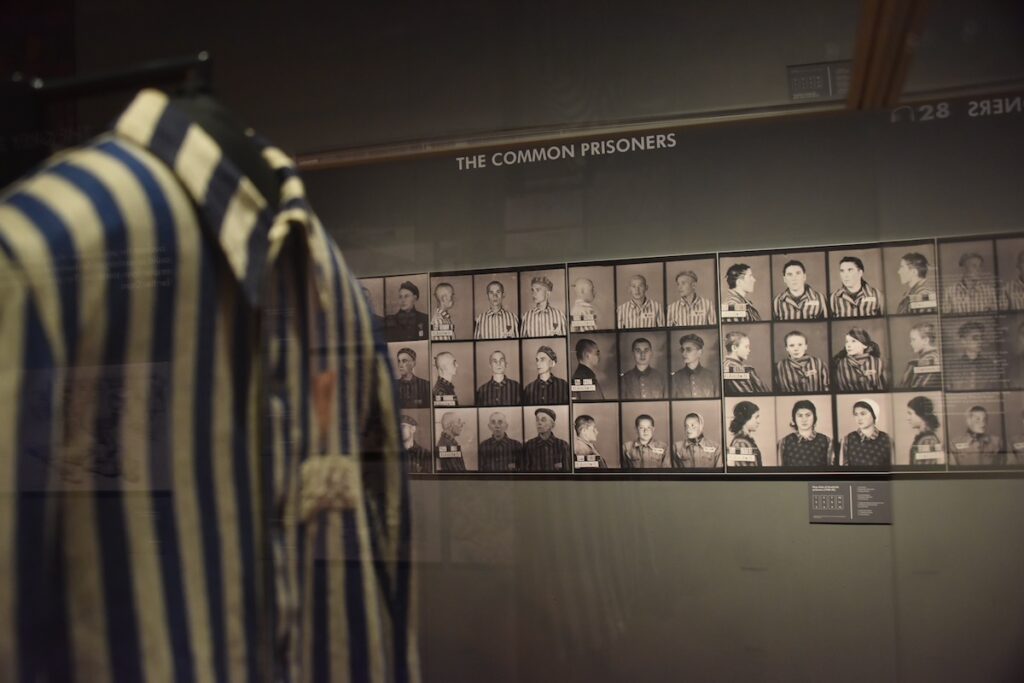
There are also the painfully ordinary stories of victims: The museum displays what’s known as the Lili Meier album, depicting the arrival of Hungarian Jews and the selection process imposed by the SS. Meier and her family were sent to Auschwitz from Bil’ki, Ukraine, then part of Hungary. They arrived on May 26, 1944, coinciding with professional SS photographers. Meier survived Auschwitz, forced labor in Morchenstern and later a transfer to the Dora-Mittelbau camp, where she was liberated. She brought the original album with her when she immigrated to the United States.
But there’s also the Hoecker album, a stark juxtaposition showing laughing SS officers socializing and having fun, likely assembled by SS Obersturmführer Karl Hoecker, chief to the commandant of Auschwitz, SS-Sturmbannführer Richard Baer.
“We see the perpetrators of Auschwitz at play in their leisurely camp, a retreat center outside of the camp—the way in which they sang, the way in which they sunned themselves, the way in which they flirted,” Berenbaum says.
The voices of survivors are also woven throughout the exhibit, including those who endured the Sonderkommando, forced to dispose of gas chamber corpses. They describe the horror of deportation and killings, but also their hope for the future.
“We’re in the twilight. We’re one minute to midnight in the life of the survivors, and we’re now about to move from lived memory to historical memory,” Berenbaum says. “Auschwitz should be far away and long ago. But we’re hearing echoes of hatred, echoes of venom, echoes of antisemitism throughout society.”
And in an era when antisemitic incidents are on the rise, particularly in Massachusetts, it’s a stark reminder that the past isn’t far away at all. As part of CJP’s initiative to combat antisemitism, CJP is providing funding for 7,000 public school students to visit the exhibition to deepen education about the Holocaust and contemporary antisemitism.
“I’d like visitors to understand where hatred can lead and where venom can take us as a society and as individuals,” Berenbaum warns. “We have a section on the rise of Nazism. A photographer went through Germany, city by city, town by town, village by village, and photographed all the antisemitic signs that were found throughout the towns: ‘Jews not wanted,’ et cetera. They put it in a photo album to demonstrate the pervasiveness of this venom. When you see that in its entirety, you realize that these have the potential not to be isolated instances of hatred but can morph into something much more explosive.”
The exhibit is recommended for visitors 12 and up.
Tickets are expected to sell out; buying in advance is recommended at theauschwitzexhibition.com.
“It’s not an easy exhibition, but it’s an important exhibition. And for a family to spend quality time with something that’s deep, that’s important, that’s relevant—I’m sorry that it’s relevant—and has to be seen through the prism of rising antisemitism and rising hatred in our society, it’s an important opportunity to go as a family,” he says.
Kara Baskin is a writer for FaceJewishHate.org. She is also a regular contributor to The Boston Globe and a contributing editor at Boston Magazine. She has worked for New York Magazine and The New Republic, and helped to launch the now-defunct Jewish Rock and Roll Hall of Fame.
Reflections From Boston Women’s Leadership Solidarity Mission to Israel
By Melissa Garlick, Senior Director of Combating Antisemitism and Building Civic Engagement at Combined Jewish Philanthropies
“Women experience war in distinctive, gendered ways.”
These words from Rachel Stomel of Israel’s Center for Women’s Justice have been resonating with me since I returned from my recent Women’s Leadership Solidarity Mission to Israel with women leaders from Greater Boston’s Jewish community.
Led by Idit Klein, president and CEO of Keshet; Rabbi Claudia Kreiman, senior rabbi of Temple Beth Zion; and Judith Rosenbaum, executive director of Jewish Women’s Archive, we spent close to three days participating in the holy obligation of bearing witness to the atrocities of Oct. 7. We spoke with impacted families and met with women who are both experiencing and responding to the war against Hamas in “distinctive, gendered ways.”
I left Israel with a heavy heart, and I feel that I am forever changed by the women I met—as well as, and especially, those who tragically lost their lives or continue to be held hostage. As I continue to process my time in Israel, I keep returning to Rachel’s quote and the ways that Oct. 7 has impacted and will continue to impact women and our response to the war.

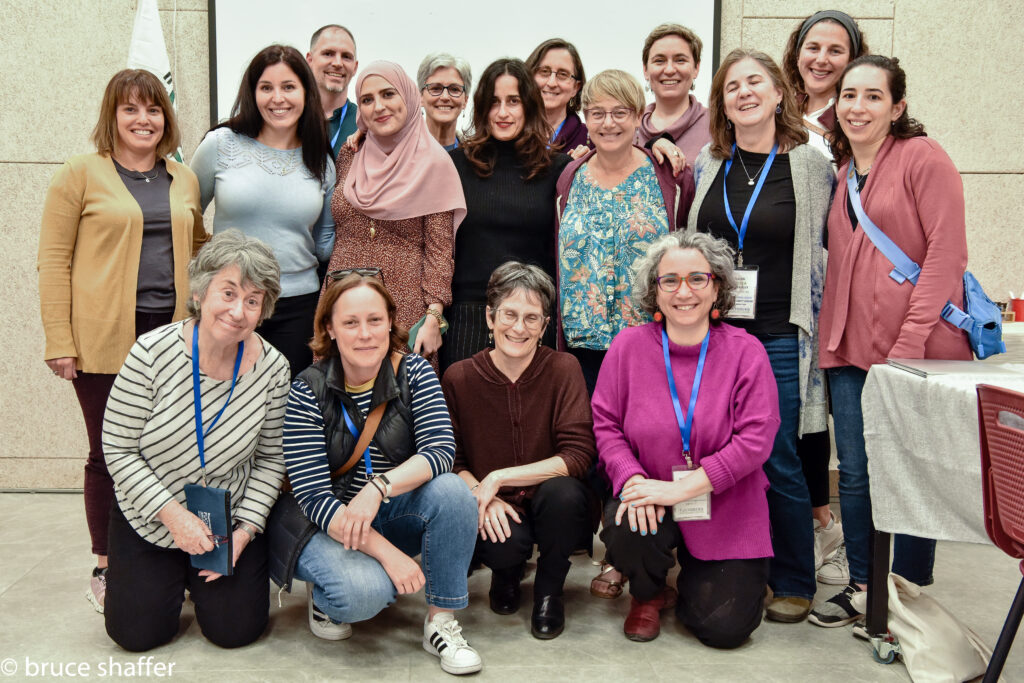 (Photo: Bruce Shaffer)
(Photo: Bruce Shaffer)
We heard the story of an incredible survivor of the Nova music festival—the eldest of three girls and the daughter of a single mother. While she was speaking, we were interrupted by the sounds of a siren and incoming rockets by Hamas. We met with Hannah, the mother of Hayyim Katzman, who continues to work for justice for women in Israel in the wake of the unimaginable grief that accompanies losing a child. Her remarkable, youngest son died while he was saving others.
We met with sisters, mothers and daughters of hostages who are still being held in Gaza, now for over 100 days, who relive the trauma of Oct. 7 each day, praying and advocating for the safe return of their loved ones while experiencing a living hell.
And we walked the grounds of Kibbutz Nirim with Adele Raemer to bear witness to the destruction, the burnt sukkahs, the charred homes and cars, the attacks on lives and the shattered dreams.
As Adele said, “We are facing an existential threat to community, and community is resilience.”
Amidst the marginalization of women in both war room decision-making and the lack of outrage and condemnation regarding the horrific sexual violence by Hamas, Israeli Jewish and Arab women are leading civil society’s immediate response efforts while carving out new paths and narratives for the future of Israel. At Wolfson Medical Center, we learned about the unique medical needs of women returnees—treatment of injuries, physical and emotional mental issues, trauma, sexual violence and assault—as well as the needs in often returning to homes that are uninhabitable. At the Rahat Jewish Arab Situation Room, Jewish and Arab women are leading mobilization and response efforts for communities of the Negev, including needs of unrecognized Bedouin villages impacted by the Hamas attacks. Through relationships and a shared responsibility to their communities, these women, even amidst their own grief and trauma, recognized and responded with immediate basic needs for survival.
At the same time, dedicated to the vision of peace and security for Israel for them and their children, women are leading legal and policy advocacy and grassroots mobilization for a new path of Israel.
We spoke to Dr. Cochav Elkayam-Levy, chair of Israel’s Civil Commission on October 7 Crimes by Hamas Against Women and Children, who is ensuring that the voices of women are heard and listened to, and that the international community responds forcefully to the atrocities committed against them. She told us, “Through recognition starts the process of justice.”
Lee Hoffman Agiv of Bonot Alternativa has led the front lines of the grassroots movement to both provide emergency aid and advance women’s representation in government. Rachel Stomel has shifted her legal and communications advocacy work to ensuring women’s legal and civil rights and independence amidst the war. And even during the grief and destruction, Jewish and Palestinian women are leading the peace movement in Israel and continue to advocate for sustainable and long-term peace and security for all in Israel. We met with leaders of Israel’s peace movement—Peta Jones Pellach from Women Wage Peace and Sally Abed from Standing Together—who continue to expand their work with renewed urgency for survival and security for the return of the hostages and a plan for Israel’s future.
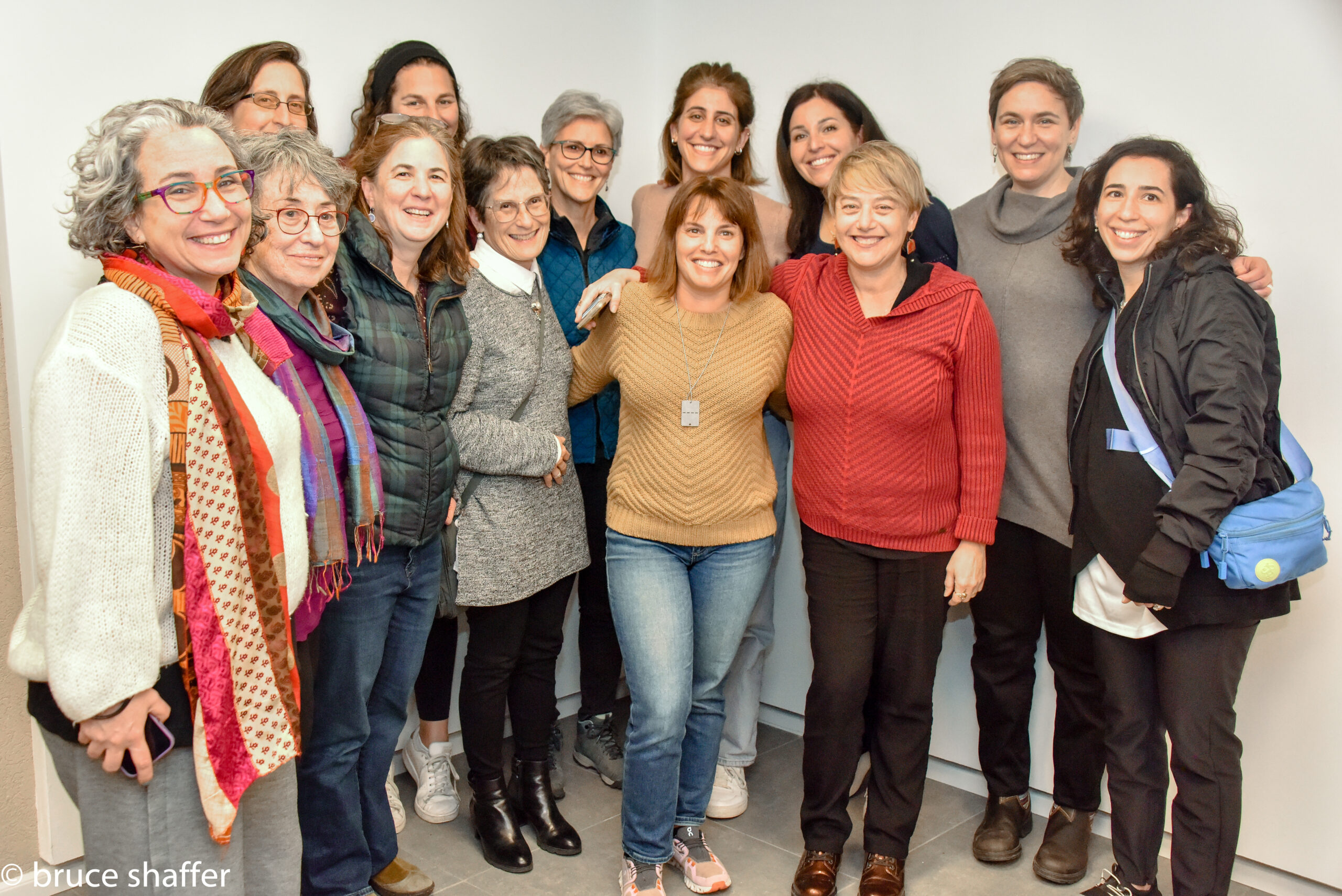
These women not only give me the inspiration, but also the responsibility to echo their leadership, innovation and a reclamation of our own narrative and voices. The people of Israel are still very much grieving and surviving, and many are still held in the hands of Hamas. They know that rebuilding will be a long road. But despite the circumstances, women are finding the strength and resilience to turn toward each other—to motivate, to innovate and to lead—meeting needs and staying true to the vision and hopes for Israel’s safety and security.
I take many lessons from this experience in our work to fight antisemitism and anti-Zionism here in Greater Boston through CJP’s 5-Point Plan. Even while some try to pit communities against each other, we must also find the strength here to turn toward each other, and to chart out new and innovative paths that will move us forward.
While we gather our strength here and find empowerment from the women of Israel, we must tell their stories and be their voices (see below).
Read more reflections from the Boston Women’s Leadership Solidarity Mission to Israel:
- The Necessity of Israeli Women’s Leadership by Judith Rosenbaum, Ph.D.
Tell their stories and be their voices:
- Watch: Dr. Cochav Levy speaking before the U.N. Convention on the Elimination of All Forms of Discrimination against Women
- Read: “Life on the Border with the Gaza Strip” by Adele Raemer
- Listen: “Voices of Women at Wartime” by Rachel Stomel and Rivkah Lubitch of the Center for Women’s Justice
- Listen: “The Women’s War Room” by Jewish Women’s Archive
- Listen: “Sexual Violence on October 7” by Jewish Women’s Archive
The Climate on Campuses: A Student’s Perspective
By Polina Kempinsky
Guest Contributor
The terror attack on Oct. 7 has shaken my worldview to the core. I stopped feeling safe, became fearful, and started to wonder where I belong. To strengthen the sentiment, there was an increase in tension and antisemitism at Harvard University.
It’s important to say that, for the most part, the support I received from many friends and professors, from the first day, was incredible. Many, including members of the Muslim community, have reached out. I felt like I was receiving an incredible hug from them, as well as from the local Jewish community, without which I couldn’t have made it.
But there were other voices as well. Some have started as early as Oct. 7; others have become louder over time. The key question, at least for me, is not whether Harvard University president Claudine Gay should resign or not. The question is what can be done to address antisemitism’s core drivers on campus—stemming from the community and the institutions.
What drives the issue?
As to the community, much of the discourse is aggressive—or occurring in an echo chamber—sometimes turning into violence. For example, much of Harvard’s internal communication is occurring on Sidechat, an anonymous community-based app, featuring almost daily antisemitic posts. Israelis in school WhatsApp groups are often receiving aggressive and antisemitic comments. There was at least one documented incident of a physical attack of a Jew on campus.
As an institution, it feels like we’re alone in this. Some relevant university officials attempt avoiding conversations with us. At the end of the day, even if officials have attended meetings with us, as the president mentioned in the hearing, the outcome is still not there. Events of aggression toward Jews are often overlooked or belittled. For example, imagine getting out of class to a chanting of “from the river to the sea”—and seeing a senior university official standing next to you, knowing that you’re Jewish, and not saying anything. At the end of the day, Jewish (as well as Muslim) students don’t feel safe on campus, and the university’s response to it, if even happening, is often too little, too late.
Looking for solutions
There are no simple solutions to these issues. I understand, respect, and cherish the right of people to free speech, but I often struggle to understand why my right to feel safe is secondary.
If I could express three wishes, I’d ask for protocols, space for bottom-up initiatives and creation of a culture of discussion.
As for protocols, I want clear guidelines as to the university’s responsibility when handling antisemitic or Islamophobic occurrences: point of contact, timelines, guidelines, and methods. I would want a clear mechanism to know that I get the protection I need, when I need it—regardless of context, in a similar manner to best practice ombudsman positions.
As for space for bottom-up initiatives, the logic stems from the university’s long time to react. It took the university over two weeks to offer “community spaces” after Oct. 7 for impacted students. Students have managed to create such spaces for themselves within hours. A month after Oct. 7, I led an initiative of small group discussions on the topic, bringing together students from across the political spectrum to openly talk about the situation—an initiative that has created collaborations and built bridges between communities. The university has been promising such a space since Oct. 7, and as of now, I have attended one such teach-in as late as December. I’m not saying this failure stems from ill intentions, as much as this is the nature of things, like markets determining prices or the benefits of democracy.
The third is creating a culture of discussion, which is in the hands of faculty. In one of my classes this semester, after receiving comments on not creating an engaging enough space, the professor asked us to debate on several topics. One of them was “for/against Black face.” As a student rightfully responded, this is as useful as debating for/against clean water. There are so many other topics that could be discussed—why are we not using them? We’re not used to having difficult or complex conversations at school, often because we’re told we don’t have to. But if we can’t do it at Harvard, where and when will we be able to do so?
Polina Kempinsky, 27, is a master’s in public policy student at The Harvard Kennedy School. She is from Israel and previously worked as a consultant at Boston Consulting Group. She holds a BA in philosophy, politics and economics from the Hebrew University of Jerusalem.
March for Israel Draws 290,000+ to Washington, D.C.
The largest Jewish gathering in U.S. history, the #MarchForIsrael on Nov. 14, 2023, brought more than 290,000 people to Washington, D.C., and an estimated 250,000 watched the event via livestream. Sponsored by Jewish Federations of North America and the Conference of Presidents of Major American Jewish Organizations, the event was a moving display of unity and solidarity with the people of Israel, calling for the return of the missing hostages captured by Hamas terrorists on Oct. 7 and denouncing the rise of antisemitism since the beginning of the Israel-Hamas war.
Our Greater Boston Jewish community was well represented at the March for Israel, with nearly 1,600 people—including grade school students, families, community leaders, allies, clergy, and college students—traveling to attend the historic event and show that Boston stands with Israel.
We invite you to watch the recording of the event below.
Opening Remarks From Rabbi Marc Baker at ADL New England’s The Good Fight Forum 2023
Rabbi Marc Baker, president & CEO of CJP, shared his opening remarks at ADL New England’s The Good Fight Forum on Oct. 10, 2023, a community event dedicated to combating antisemitism and hate.
Dear Friends,
As we’ve already heard, we are here this morning at an unprecedented time in this history of the State of Israel and the history of the Jewish People.
Several years ago, this gathering, this Good Fight, was created as a response to the most horrific and deadly antisemitic attack we had ever experienced here in America – the Tree of Life shooting. It devastated the Pittsburgh community, touched many people here in our own community, and in many ways changed Jewish life in America as we now know it. Let us keep the Tree of Life victims in our hearts and minds today and always.
We are here because the hatred that has plagued the Jewish community and the world for thousands of years is not only alive and well, but still growing here in America and right here in our own community – in schools, on college campuses, from the egregious displays of white supremacists blaming 9/11 on the Jews to casual workplace conversations and the social media of pop stars and professional athletes.
This morning, we are here one day after thousands of us gathered on Boston Common to stand in solidarity with Israel and to raise our voices – together with friends, allies, elected officials and other local leaders. We gathered to express our love, solidarity, grief, anger, and moral outrage at the horrific and heinous acts of terror that have taken over 900 innocent Israeli lives. The Good Fight taking place right now in Israel is a war to protect the innocent lives of our Jewish family thousands of miles away and to protect the future of the Jewish homeland.
And this is not just far away – it is already touching nearly every one of us in some way or another, whether one of the tens of thousands of Israelis living here in Greater Boston or American Jews who have friends and family living in Israel and defending the Jewish State. My personal friends and family had to go directly from yesterday’s rally to the home of dear friends to escort them the airport after they learned that their son-in-law – a young man with a tremendous spirit, love of Israel, and bright future ahead of him – was killed in battle.
My friends, in the past few days we have witnessed the largest, most gruesome massacre of Jews that I have seen in my lifetime and that we have seen since the Holocaust. We are here today to fight for our own safety and well-being and for the future of our community and this country; Israelis are in a fight for their lives; and we are living through the darkest moment of hatred and violence against Jews that many of us have ever known.
Add to this the vile and incomprehensible response that we have seen in the streets of Cambridge and on college campuses – a defense of terror and violence rooted in ignorance and extremist, antisemitic ideologies that demonize Israel and dehumanize Israelis, and that, in fact, threaten the safety, security and well-being of Jews, especially, but not exclusively, our young people.
We are here today to better understand these challenges and what we can do about them, again with gratitude to the partners and leaders from across our community who are doing this work everyday in so many different ways.
Put simply, we have work to do. We have work to do to educate, advocate, and mobilize our communities, along with friends and allies, to fight against all forms of antisemitism, especially right now against Israel-hatred, along with all other forms of bigotry and hate; to fight against forces of extremism, conspiracy theories and other forms of disinformation and demonization; and to ensure that every person can walk down the street and through the world with head held high with a sense of safety, security, confidence in their personal identity and belonging in the larger society of which we are a part.
We have work to do to create communities and a world where everyone – of every religion, race, gender, sexual orientation – feels free, safe, accepted, and valued.
We have work to do, which is why I’m so proud that over the past year CJP has partnered with ADL and so many other organizations to launch our 5-Point Plan to combat antisemitism and anti-Zionism. We will not likely eliminate a 3,000-year-old hatred in our lifetimes, but we will certainly be stronger and fight against it more effectively when we fight it together.
Together, we are educating and mobilizing our community. Together, we are putting faces and stories to the personal experiences of Jew-hatred through our Face Jewish Hate media campaign, and we are partnering with the Foundation to Combat Antisemitism’s national blue square campaign so more people who share our values will #StandUpToJewishHate.
Together, we are expanding community security to ensure that we and our children will be safe and secure as we choose to live engaged, vibrant, joyous Jewish lives in our schools and synagogues and community centers.
Together, we are deepening relationships with allies and leaders from across civic Boston because this is not a Good Fight that we will win alone, and as my friend, JCRC CEO Jeremy Burton, always reminds us, antisemitism, like other forms of hate, is not a problem for the Jewish community to solve on our own.
It was heartening, comforting, even inspiring to launch our Face Jewish Hate campaign at TD Garden side by side with important and influential political and faith leaders; just as it was heartening yesterday to hear the unequivocal support for Israel and condemnation of terror from so many of our friends, allies and elected officials. That only happens because of the work ADL, JCRC, so many of the partners here today, do to deepen these relationships, to stand with and show up for other vulnerable communities, to fight for democracy, human dignity, and for the character of our commonwealth and our country. I feel grateful and hopeful that we are in this fight, this Good Fight, with friends and allies who will stand with us, and that we are in this with one another, together.
Thank you.
Answering the Call: From Boston to D.C., United Against Xenophobia
By Rebeccah Lipson, Repair the World Fellow, Boston
This summer marked a significant turning point in my journey as I embarked on a new chapter with Repair the World, an organization that mobilizes Jews and their communities to actively pursue a more just world. Little did I know that this commitment would soon lead me and my dedicated team to a powerful moment of action: the 60th anniversary March on Washington.
As Rabbi Abraham Joshua Heschel once wisely noted, “The opposite of good is not evil; the opposite of good is indifference.” At Repair the World, we understand that our purpose goes beyond passive observation of the world’s injustices. It’s about stepping forward, taking action, and making a tangible impact. This philosophy, encapsulated by Rabbi Heschel’s words, has shaped my summer and propelled me toward the heart of a movement that echoes with historical significance and calls for a united stand against all forms of discrimination and injustice.
As the summer unfolded, my team and I grappled with the notion of responsibility. We spent hours at cafes, synagogues, and parks discussing the various forms of injustices Boston is facing. We recognized that we, as Jews, have a unique obligation to address and combat xenophobia in all its manifestations. The decision to journey from our base in Boston to Washington, D.C., wasn’t just a logistical one; it was an unequivocal statement of our commitment. We wanted to take what we learned and put it into action. This trip to D.C. was a manifestation of the Jewish value of na’aseh v’nishma, action and learning. We firmly believe that when given an opportunity to fight against forms of xenophobia, it is our duty to seize it.
The 60th anniversary March on Washington holds a special resonance for me, not only due to its historical significance but also because of the values it represents. Dr. Martin Luther King’s legacy reverberates through the decades, reminding us that the struggle for justice and equality is ongoing. As I stand on the precipice of this march, I can’t help but reflect on the parallels between the civil rights movement and the issues we continue to grapple with today, such as food insecurity and housing injustice that brown and Black Bostonians continue to face today.
The decision to march alongside CJP, in collaboration with ADL, speaks volumes about our collective determination. It’s a testament to the power of solidarity, achdoot, in the face of adversity. Our call to serve goes beyond the march. Our call to serve enables us to take direct action in the name of tzedek, justice. The march itself is a continuation of a journey that began 60 years ago, and we’re here to carry forward the torch of progress and equality.
Our dedication isn’t merely symbolic; it’s a reflection of our unwavering belief that combating xenophobia, racism, and discrimination is central to our identity as Jews. We’ve faced our own historical struggles, and that shared experience binds us to the broader tapestry of individuals who have fought and continue to fight for their rights. Just as we would expect others to stand with us against antisemitism, we recognize the imperative of standing with those who face other kinds of hate.
In a world where divisiveness can seem all-encompassing, this march becomes a beacon of hope. It’s a space where individuals from different backgrounds come together with a shared purpose: to reshape the future into one that’s inclusive, just, and equitable. It’s a moment to amplify the voices of those who have been marginalized and silenced, and to challenge the structures that perpetuate inequality.
As we prepare to gather for Shabbat dinner with members of the King family and leaders of the march, the significance of our presence becomes even more palpable. It’s not just about showing up; it’s about actively participating in a service movement that’s greater than ourselves to change the world for the better.
I’m humbled by the journey that brought me here and excited about the journey that lies ahead. This summer, Repair the World gave me purpose, and, like Jewish service, this march gives me another opportunity to turn that purpose into action.
As Rabbi Heschel’s words remind us, our refusal to be indifferent is the spark that ignites lasting change.
Stay informed with our antisemitism newsletter
Eyes Wide Open: A Sweatshirt in a Time of Antisemitism
By Dan Brosgol
The day after Maccabi Haifa beat Juventus in the UEFA Champions League, I wore one of their green-and-white jerseys to work—I have an embarrassingly large collection of them from all the time I’ve spent in Haifa. It was a great conversation starter with all the people I ran into, but there was always a little pause when I wondered if I should mention that Maccabi is an Israeli team. It’s not dissimilar to when British people ask me why I’m a Liverpool fan and after some hesitation I talk about how I started rooting for them when Yossi Benayoun signed there.
Every day is rife with these little hinges of decision points. Should I post about Maccabi’s win on Facebook? Yes. Should I change my profile frame to say “I stand with Israel” during rocket attacks from Gaza? I did. Should I retweet the Israel Defense Forces posts about the terrorists killed in Jenin? Did I? I forget. How stridently should I take up pro-Israel activism on social media? Tough one.
In some respects, wearing the Maccabi jersey felt easy; the Jewish star is subtle, and the Hebrew print is small on the badge. But will I wear my Team Israel baseball sweatshirt around for a day in public during the World Baseball Classic? The sad answer is that until a few years ago, I would have done it without thinking, but now it’s a maybe. And if I’m being honest, it’s probably a no. Try as you might (and I’m not trying hard at all) to find one, in almost every case there is no border between anti-Zionism and antisemitism, and I’d immediately be a target.
I have the great privilege of making these calculations in Middlesex County, home to roughly 180,000 Jews; if you do the math, about one out of every 10 people you run into around the 128 corridor is Jewish. That’s one heck of a Jewish bubble—1% of all the Jews in the world live around here, and if you draw a circle around 495 and Southern New Hampshire, more than 2% of all the Jews anywhere live within an hour of my house. Is there strength in those numbers? You bet. I should feel comfortable expressing my Judaism, whether rooted in religion, Zionism or culture, without fear. But it’s not that easy.
To be fair, it wasn’t that easy, well, ever. Generations ago, Jewish kids in Boston used to get beat up on their way to Boston Latin School. When I was a kid, I was teased mercilessly for being Jewish and was told in no uncertain terms in middle school that I killed Jesus. And a few years ago, our town made headlines nationally (and in Al-Jazeera, somehow) for a spate of antisemitic incidents. And, in case you forgot, there’s plenty more antisemitism to go around today; I’d list some of those recent news stories here, but I don’t have enough room.
I walk around with Judaism burning through my veins all day, every day, yet when people see me, I’m just another white guy, with all the privilege attached to it. But the second I show my Judaism, there’s an instant risk, and it has to be calculated. And if I’m having second thoughts in one of the largest Diaspora Jewish communities in the world, then imagine how it is for Jews just about anywhere else. Would you feel safe walking around visibly Jewish in Malmo, Sweden? In Paris? In certain parts of Florida? How about when the Proud Boys were riding the T to and from Malden? The answer to all of those questions is no.
If there’s good news, it’s that the demise of the American Jewish community has been greatly exaggerated—we are still alive and kicking. And despite the never-ending drumbeat of terrible news, it’s fair to say there’s nowhere I’d rather be Jewish, although as I have muttered for some time now, Toronto and Tel Aviv are also looking pretty good. The thread that ties all those cities together is that there are Jews there, there is community there, and there is great strength in those numbers.
While it’s never a bad time (or is it never a good time?) to joke about our holidays and their usual refrains, it’s worth repeating: You know the punch line—they tried to kill us, we survived, let’s eat; it’s gallows humor, but it’s also true. In the spring, in particular, we celebrate Purim, perhaps the greatest celebration of a triumph over antisemitism, and Passover, an unlikely tale of survival, redemption and freedom from oppression. And as far away as those events feel from today, they are dangerously and disappointingly relevant.
Do you need more prodding? During the V’hi She’amda passage at the Passover seder, we sing: “Not only one enemy has risen up against us to destroy us, but in every generation they rise up to destroy us.” The happy-ish ending to that text is, “But the Holy One, Blessed be He, delivers us from their hands.”
But not always.
The danger in history repeating itself is that history has been pretty rough for us. If we’re being honest, there’s not usually a hero who rises to defend us, a miracle to save us or a golem to protect us; more often than not our hope for salvation ends up being like waiting for Godot. But through it all, a 2,000-year Diaspora featuring the Crusades, the Inquisition, blood libels, the Holocaust and untold other tragedies, we are still here.
So, I guess I’ll bet on us, but with my eyes wide open. I’m just not sure if I’ll wear that sweatshirt around Whole Foods. But maybe I should.
Dan Brosgol has been writing for JewishBoston.com since 2010. He lives in Bedford with his wife and five children.
How I Maintain Hope
By Rabbi Danny Burkeman
My dad’s mother was born in Berlin in 1923 and was one of the lucky ones who escaped before World War II began and the borders were closed. But she still lived through the introduction of a variety of anti-Jewish laws and was there when her synagogue was attacked on Kristallnacht. She experienced one of the darkest moments in Jewish history and rebuilt her life and family in England.
For me, two generations later, growing up in England, her experiences were completely foreign to what I encountered. But there was a sense of vulnerability in the Jewish community. I don’t remember ever going to a Jewish event without security outside the building, both paid professionals and volunteers from the community. There, a requirement of synagogue membership for each family was to be on security for at least one or two Shabbat services every year.
The American Jewish experience has been markedly different; it’s a community that has generally felt settled, accepted and safe. But any study of Jewish history is a reminder that antisemitism has always been there, often lurking in the background. And in the past few years, we have unfortunately borne witness as it has emerged from the shadows and become far more prevalent than at any time in recent history.
Despite this reality, fundamentally, the Jewish people are at our core the people of tikva—hope. We always believe that things can and will get better. We are the people who recognize that we are on a never-ending journey toward a Promised Land, even though at times our progress might seem slow. And we are the people whose memories stretch back through countless generations, and we therefore know that the forces of hate are temporary, while the power of good is eternal.
But it isn’t always easy to maintain tikva (hope) when the world appears dark. In many ways, this is the light that we are called to bring for the world, but it is also a light that we need to share with each other.
I maintain tikva because I know that in the face of antisemitism, I have a network of colleagues and friends from outside of the Jewish community that I can call on for help and support. In the aftermath of the terrible attack on Congregation Beth Israel in Colleyville, Texas, I was able to reach out to my clergy colleagues in the Wayland Interfaith Leaders Association to let them know that the Jewish community was hurting and in need of support. They all responded to let me know that they were ready to stand shoulder-to-shoulder with us and help us in any way we needed.
I am filled with tikva because we are not alone in the fight against hate and prejudice. While white supremacists and other hateful groups might seek to drive wedges between the various communities they target and attack, we remain united and will always stand together in support and solidarity of one another. In Framingham, when we wanted to mark Indigenous Peoples Day with a celebration of love conquering hate, it was a predominantly Black church (the Greater Framingham Community Church) and a synagogue (Temple Shir Tikva) that led the way. We stood shoulder-to-shoulder, arm-in-arm, in responding to antisemitism, racism and prejudice.
And I am bursting with tikva because I have the privilege of working with amazing Jewish teenagers who are finding a way to define and nurture their Jewish identity in new and inspiring ways, despite the antisemitism we may be experiencing. It’s easy to focus on the negative, but in our synagogue, I get to witness these teenagers nurturing Jewish community, standing up for what they believe in and building a bright Jewish future. They are so secure in their identity as Jews and Americans, and as they assume leadership roles in the Jewish community and in society in general, I am certain they will defeat the forces of hate and ensure a brighter future for us all.
Rabbi Danny Burkeman is the senior rabbi at Temple Shir Tikva in Wayland. He is committed to making Judaism relevant in the modern world and always looking for new ways to engage people with Jewish community. He has a weekly podcast, “Two Minutes of Torah,” and was a member of the UJA Federation of New York’s inaugural Rabbinic Fellowship for Visionary Leaders.

